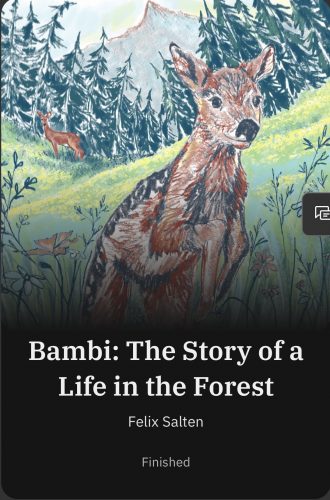
I’m delighted to be the first stop on the blog tour today for ‘Bambi’ on Audrey.
Yes, ‘Bambi’, written by Felix Salten, newly translated and introduced by Jack Zipes to celebrate 100 years since the original publication, and read by John Chancer. You may be familiar with the Disney film, but Salten’s original novel was written for adults and is, at heart, a coming of age tale, a novel that urges greater love of the environment, and an allegory highlighting the experiences of the marginalised and oppressed Jewish community.
In his translation, Zipes aims to provide a more faithful interpretation of Salten’s original novel, reintroducing anthropomorphic touches that were omitted in the popular 1928 English translation by Whittaker Chambers. There is interesting discussion of choices made by the translators throughout the guiding notes and in Zipes’ introduction, which is the final chapter of this book.
What’s it about?
Bambi is born in a beautiful but dangerous forest world. His mother urges him to stay hidden in the safety of the forest during the daytime and to occasionally frolic in the meadow while always being vigilant against Him – the hunter. As time passes, Bambi meets relatives and makes friends, but also loses his mother to Him while still young. He admires an old stag from a distance and, as the novel progresses, begins to identify more closely with the isolated old Prince, eventually taking his place.
What’s it like?
Full of surprising diversions – including chapters which explore the demise of a leaf and the gossip of birds – ‘Bambi’ shows the brutality of nature whilst simultaneously implying that animals are better than humans. The book is certainly darker than I remember the film being: Bambi’s love interest, Faline, has a brother, Gobo, who loses his fear of man and is punished for it; and, rather than concluding with a tableau of a fully grown Bambi protecting his family, the book closes on a solitary Bambi, who has abandoned love in preference for the independence that the old Prince encouraged.
Whilst Bambi’s ultimate solitude makes perfect sense from a naturalistic point of view, Salten’s frequent anthropomorphism (we hear his mother’s cries as she gives birth) means that this feels like a slightly sad ending. Salten, however, clearly saw this as the appropriate conclusion, as Bambi’s coming of age – his education and training – is complete.
What is Audrey?
I listened to this story on Audrey, an ‘audiobook app where a curated library of classic novels, novellas and short stories are paired with an expert guide and an illustrator. The guide (in this case, Shauna Laurel Jones,) offers insightful multi-media notes on the book after each chapter, including historical context, author info, personal reflections, discussion questions, photos, a Spotify playlist and more. All books on Audrey come with chapter recaps and character descriptions too.’
I love finding out more about books as I read them, so I was excited about the bonus content. I read all the notes, pausing to do so after listening to each chapter, and followed up most of the links, which followed diverse themes and showed awareness of differing historical attitudes. I even listened to the Spotify playlist. Considering that the cost of books on this platform seems currently to be equivalent to the cost of books without these additional features on other platforms, I’m not surprised that Audrey are planning to increase their costs soon.
I really liked all the extra features, but as I currently borrow all my audiobooks for free, I’m not sure I would invest in an Audrey audiobook – though I am very tempted by ‘Metamorphosis’, which feels like a book you would definitely benefit from having a guide alongside, and also by ‘Pride and Prejudice’, one of my all time favourite books (though actually I feel like I could write my own guide for P&P!) If you do buy audiobooks, though, I think buying them from this platform could really enhance the listening experience.
Final thoughts
Although I like to read classic literature, I don’t think I would have considered reading ‘Bambi’ without being offered this audiobook. I found the story darker than the Disney film and, with one particularly upsetting scene of death and destruction, and a generally existential tone, can now understand why this was published as an adult novel.
I liked the narration and found the guide generally interesting, especially when Jones discusses the tension between Salten’s actions as a hunter who shot and killed deer and his writing as a novelist, which emphasises the animals’ abject terror of the hunter. Perhaps, Jones suggests, for Salten these opposing viewpoints are more easily integrated than it may first appear: ultimately, as the old Prince explains to Bambi, the hunter is also mortal, and therefore arguably equal to rather than truly dominant over the deer and the other creatures of the forest.


